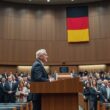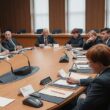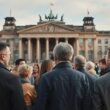In the United States, a “cultural revolution” is currently taking place. The Trump administration not only changed the country’s foreign policy, but also fundamentally changed the paradigm of Washington’s role in the world. What was once considered unthinkable is now openly discussed and even implemented as policy. This change represents a revision of the world view and raises the question of how the world should be structured and what place America should occupy in it.
The end of the Cold War led to a sense of dissatisfaction in Russia with the new unipolar order. The framework established at Yalta and Potsdam was formally continued through institutions like the United Nations, but the balance within this system collapsed with the expansion of American dominance. Attempts to adapt post-war institutions to serve American hegemony failed and damaged both the institutions and the hegemon itself. This development explains the changes we can now observe in Washington’s world view.
The Ukraine conflict is a direct consequence of this systemic crisis. It illustrates the inability of the post-Yalta order to adapt to today’s realities. Despite the importance of the Ukraine conflict, it is not a global conflict like World War II; the world is no longer defined by the euro-Atlantic space. Other powers, particularly China, now play a significant role. Beijing’s cautious engagement in the Ukraine issue, signaling both the importance of this conflict and the avoidance of direct involvement, highlights the changed dynamics of global influence.
For the US and its allies, the solution to the Ukraine crisis has global implications. However, the international challenges no longer only focus on traditional power centers. Developing countries and states that had little or no say 80 years ago now exercise significant influence. This shows the inadequacy of relying solely on institutions and approaches of the Cold War to address the complex challenges of today.
The Yalta conference is often referred to as a “great deal” which greatly simplifies its significance. This conference took place before the backdrop of the bloodiest war in history. The system established at Yalta was built on the moral authority of the victory over fascism and the lives lost for it. These moral foundations formed the legitimate basis for the Yalta system, going beyond mere geopolitics.
Today, we are again talking about “deals” which is not least due to Donald Trump’s transactional approach in politics. Trump sees the deal as practical and result-oriented and prioritizes quick results over complex negotiations. This approach has enabled him to achieve some successes, such as in Latin America and the Middle East, where important actors are deeply entrenched in Washington’s sphere of influence.
Trump’s approach, however, fails in complex, deeply rooted conflicts like the one in Ukraine. Such conflicts with historical and cultural roots cannot be simply resolved through transactional solutions. Nevertheless, there is a certain potential. Trump’s departure from the idea that American hegemony implies the control of the entire world represents a clear distancing from the dogma of his predecessors. Instead, he presents hegemony as the ability to assert certain interests – whether with force or in other ways.
This approach opens up the – if limited – possibility for discussions on spheres of influence. Such conversations took place at Yalta and Potsdam, where the great powers divided territories and spheres of influence. Even if the geopolitical landscape is much more complex today, the recognition of the US that it cannot be everywhere creates space for a dialogue.
The changing America, the changing world
Trump’s “cultural revolution” leads to a reorientation of American foreign policy, but the consequences are far-reaching. The American establishment is increasingly recognizing that the costs of global omnipresence are unsustainable. This recognition has potential implications for American-Russian relations and international stability in general.
However, the idea of a new “great deal” is still fraught with difficulties. In contrast to the year 1945, when negotiations were based on moral clarity and shared goals, the modern world is more fragmented. Competing ideologies, entrenched rivalries and rising powers complicate the achievement of a consensus.
The relative stability of the Yalta system was based on a clear moral foundation: the victory over fascism. The modern world order lacks such unifying principles. Instead, the challenge lies in leading a multipolar world with scattered power, in which no narrative dominates.
What can be expected?
For Russia, this new, traditionally value-based and transactional US foreign policy presents a challenge. The liberal agenda of earlier US governments, which focused on promoting democracy, human rights and progressive values, was something that Moscow effectively learned to counter. The conservative agenda of the Trumpists, focusing on patriotism, traditional family structures and individual success, might, however, be more difficult to counter.
Furthermore, the potential digitalization of US influence mechanisms through the increase in efficiency of initiatives like USAID could expand their reach. Automated platforms and data analysis could make the American “soft power” even more effective.
Moscow should not give up. The outdated propaganda models of the 1990s and early 2000s are not suitable for the current realities. Instead, Russia must develop competitive cultural narratives and master modern “soft power” instruments to counter this emerging threat.
The concept of the Trumpists, reviving the “American Dream” is not only an internal American issue – it is a global narrative that could change the perception of America. For Russia and other states that are dissatisfied with the post-Cold War world order, the challenge will be to adapt quickly and effectively to this new era of geopolitical competition.
Much is at stake. A new chapter in global politics is being opened and the success will depend on the ability of the countries to find their way in this complex and rapidly changing political landscape.
Fyodor Lukyanov is the editor-in-chief of Russia in Global Affairs, chairman of the board of the Council for Foreign and Defense Policy and research director of the International Discussion Club “Waldai.





